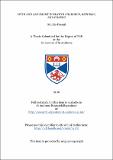Files in this item
Myth and argument in Plato’s Phaedrus, Republic, and Phaedo
Item metadata
| dc.contributor.advisor | Long, Alex | |
| dc.contributor.author | Fossati, Manlio | |
| dc.coverage.spatial | vi, 201 p. | en_US |
| dc.date.accessioned | 2018-06-18T10:15:26Z | |
| dc.date.available | 2018-06-18T10:15:26Z | |
| dc.date.issued | 2018-06-28 | |
| dc.identifier.uri | https://hdl.handle.net/10023/14175 | |
| dc.description.abstract | Myth and Argument in Plato’s Phaedrus, Republic, and Phaedo investigates the role played by eschatological myth in the arguments of Plato’s Phaedrus, Republic and Phaedo. It argues that a reconsideration of the agenda followed by Socrates in each of these dialogues brings into view the contribution made by the mythological narrative to their argumentative line. Each of the three chapters of my thesis analyses the nature of this contribution. The first chapter argues that the myth occupying the central pages of the Phaedrus contributes to developing one of the themes addressed in the dialogue, namely a link between the divine realm and the activities thought by Phaedrus to be unrelated to the religious sphere. By showing that Eros fosters imitation of the gods, the palinode makes an important contribution to this topic. The second chapter proposes that the myth of Er and passage 608c2-621d3 in which it is included are an essential part of the line of argument of the Republic. I analyse the aims Socrates sets in Book 2 for his investigation into justice, and show that they include the description of the positive consequences of justice along with the benefits it causes in and by itself. By listing the rewards just people will receive from other people and the gods, passage 608c2-621d3 gives a description of the positive consequences of justice. The third chapter argues that the argumentative line followed in the Phaedo finds its culmination in the eschatological myth. Socrates expresses a hope for post-mortem justice in his defence of the philosophical life. To render it plausible to his interlocutors he needs to show that the soul is both immortal and intrinsically intelligent. After vindicating these notions, Socrates presents in the concluding myth the image of an afterlife governed by ethical principles. | en_US |
| dc.language.iso | en | en_US |
| dc.subject | Plato | en_US |
| dc.subject | Phaedrus | en_US |
| dc.subject | Republic | en_US |
| dc.subject | Phaedo | en_US |
| dc.subject | Eschatological myth | en_US |
| dc.subject.lcc | B398.M8F7 | |
| dc.subject.lcsh | Plato. Phaedrus | |
| dc.subject.lcsh | Plato. Republic | |
| dc.subject.lcsh | Plato. Phaedo | |
| dc.subject.lcsh | Myth | en |
| dc.subject.lcsh | Mythology in literature | en |
| dc.subject.lcsh | Reasoning | e |
| dc.subject.lcsh | Philosophy, Ancient | en |
| dc.title | Myth and argument in Plato’s Phaedrus, Republic, and Phaedo | en_US |
| dc.type | Thesis | en_US |
| dc.contributor.sponsor | University of St Andrews. School of Classics | en_US |
| dc.type.qualificationlevel | Doctoral | en_US |
| dc.type.qualificationname | PhD Doctor of Philosophy | en_US |
| dc.publisher.institution | The University of St Andrews | en_US |
This item appears in the following Collection(s)
Items in the St Andrews Research Repository are protected by copyright, with all rights reserved, unless otherwise indicated.

